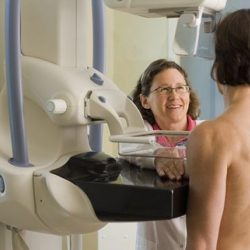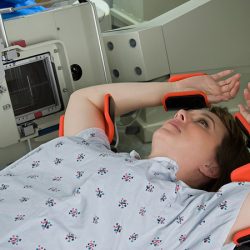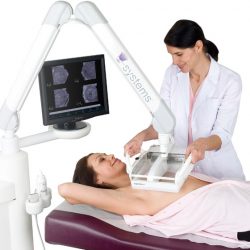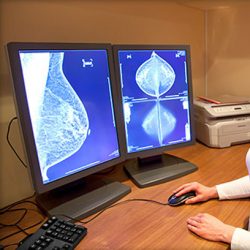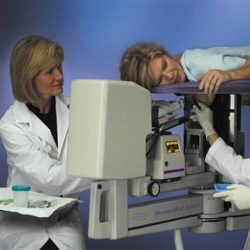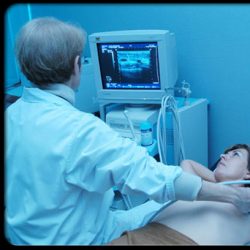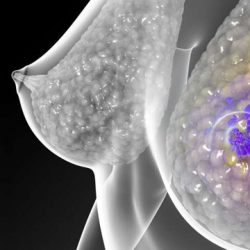Long-term (five-year) outcomes of breast cancer patients receiving adjuvant accelerated partial breast irradiation (APBI) after breast-conserving surgery show excellent tumor control and breast cosmesis (cosmetic outcomes) with minimal late toxicity, according to a study published in the February 1, 2014 print edition of the International Journal of Radiation Oncology, Biology, … [Read more...]
Breast Cancer News

Management of breast biopsy abnormalities: A Study
Contrary to existing understanding, long-term follow-up of patients with two types of breast tissue abnormalities suggests that both types of abnormalities have the same potential to progress to breast cancer, according to a study published in Cancer Prevention Research, a journal of the American Association for Cancer Research. Findings from this study could improve clinical … [Read more...]
Epigenetic alterations may contribute to age-related breast cancer risk: A Study
Age is a key risk factor for breast cancer. A recent study by researchers from the Dartmouth-Hitchcock Norris Cotton Cancer Center (NCCC), "Age-related DNA methylation in normal breast tissue and its relationship with invasive breast tumor methylation," examines the connection between cancer and the aging process to see if epigenetic DNA alterations might contribute to … [Read more...]
Obesity in relation to breast cancer: New York University Study
Each year, about 1.38 million women worldwide are diagnosed with breast cancer. Advances in treatment have facilitated a 90% five-year survival rate among those treated. Given the increased rate and length of survival following breast cancer, more and more survivors are facing life-time risk of developing late effects of cancer treatment that negatively impact long-term … [Read more...]
Breast cancer risk increased in young women after treatment for Hodgkin’s disease: A German Study
Girls treated for Hodgkin's disease during adolescence acquire a considerable risk of developing breast cancer, as shown by an observational study published in the current issue of Deutsches Ärzteblatt International. The study, which was carried out by Günther Schellong and his colleagues in the German Working Group on the Long-Term Sequelae of Hodgkin's Disease, has an … [Read more...]
Olive oil component investigated for breast cancer prevention: A Study
A major component of olive oil, hydroxytyrosol, is the subject of a Houston Methodist study of women who are at increased risk of developing breast cancer. The study focuses on the changes in breast density after one year of treatment and is the first of its kind in the United States. Tejal Patel, M.D., breast medical oncologist with Houston Methodist Cancer Center, leads … [Read more...]
Moderate doses of radiation therapy to unaffected breast may prevent second breast cancers: Columbia University Study
Survivors of breast cancer have a one in six chance of developing breast cancer in the other breast. But a study conducted in mice suggests that survivors can dramatically reduce that risk through treatment with moderate doses of radiation to the unaffected breast at the same time that they receive radiation therapy to their affected breast. The treatment, if it works as well … [Read more...]
Researchers developing new approach for imaging dense breasts for abnormalities: A Study
Dartmouth engineers and radiologists are developing new approaches for an emerging technique in diagnostic imaging for breast cancer -- MRI with near-infrared spectroscopy (NIRS) as reported in the journal Academic Radiology, February 2014. Combined MRI/NIRS may benefit women whose mammogram showed an abnormality and requires further testing to rule out cancer. The test … [Read more...]
Breast cancer: University of Virginia Study
Researchers at the University of Virginia School of Medicine have taken a new approach to understanding why so many breast cancer patients in Appalachia aren't getting the care they need, and their findings are set to change how people view the obstacles to care that beset the region. For example, the distance patients have to travel for cancer care is often viewed as a … [Read more...]
Mammography screening: Only one in three women is well-informed: A German Study
Only one in three women participating in Germany's mammography screening programme (MSP) is well-informed about it: the higher the level of education, the greater the chance of women making an informed decision. These are the results of a study that health care researchers at Bielefeld University are publishing today (03.11.2015) in the international specialist journal PLOS … [Read more...]
Mastectomy plus reconstruction has highest rate of complication: University of Texas Study
In a review of guideline-concordant treatment modalities for women with early stage breast cancer, mastectomy and reconstruction had the highest rate of complications and complication-related costs, regardless of age. It was also the most expensive treatment option in a younger patient population, according to a new study from The University of Texas MD Anderson Cancer … [Read more...]
Five out of six women at higher risk reject drugs to prevent breast cancer: A Study
Cancer Research UK scientists have found that five in six women with increased risk of breast cancer turn down drugs likely to prevent the disease, according to research published in Annals of Oncology. Researchers at Queen Mary University of London collected data from 26 international studies totalling more than 21,000 women of all ages who were at increased risk of … [Read more...]
Key mechanisms that inhibit triple negative breast cancers: Case Western Reserve University Study
A team of researchers from the Cleveland Clinic and Case Western Reserve School of Medicine have identified critical complex mechanisms involved in the metastasis of deadly “triple negative” breast cancers (TNBC). These tumors are extremely difficult to treat, frequently return after remission, and are the most aggressive form of breast cancer in women. The discovery of this … [Read more...]
Subgroups of breast cancer identified with varying sensitivities to treatment: A Spanish Study
Research led by the Translational Genomics Group at Vall d'Hebron Institute of Oncology (VHIO) in Barcelona has not only shown that HER2+ breast cancer can be classified into four different subtypes, but also unmasked a subtype showing both a greater response to and increased benefit from chemotherapy and anti-HER2 therapy. Such newly, refined classification of different tumor … [Read more...]
Scientists propose breast cancer drug for bladder cancer patients: A Study
Researchers at Mayo Clinic have found amplification of HER2,a known driver of some breast cancers, in a type of bladder cancer called micropapillary urothelial carcinoma (MPUC) and have shown that the presence of HER2 amplification is associated with particularly aggressive tumors. These findings suggest that administering trastuzumab to MPUC patients with HER2 amplification … [Read more...]
Large amounts of folic acid shown to promote growth of breast cancer: A Study
Folic acid supplements at levels consumed by breast cancer patients and survivors in North America promoted the growth of existing breast cancer in rats, new research found. The role of folate, a B vitamin, and its synthetic form, folic acid, in the development and progression of breast cancer is highly controversial. Although some studies have found it may offer protection … [Read more...]
Lymph node ultrasounds more accurate in obese breast cancer patients: A Study
Mayo Clinic research into whether ultrasounds to detect breast cancer in underarm lymph nodes are less effective in obese women has produced a surprising finding. Fat didn't obscure the images -- and ultrasounds showing no suspicious lymph nodes actually proved more accurate in overweight and obese patients than in women with a normal body mass index, the study found. The … [Read more...]
Survival has improved for women with stage IV breast cancer: A Study
A study that included more than 20,000 women with stage IV breast cancer finds that survival has improved and is increasingly of prolonged duration, particularly for some women undergoing initial breast surgery, according to the report published online by JAMA Surgery. Breast cancer is the most common malignancy in women in the United States and the developed world. … [Read more...]
Breast cancer with depression linked to Lower survival rates: King’s College London Study
Women with breast cancer who subsequently had a recorded diagnosis of depression had a 45% higher risk of death from all causes, according to a study led by King's College London. The researchers suggest this finding could help to target and support those women most at risk of depression. The study, published in Psycho-Oncology, analysed cancer registration and hospital … [Read more...]
Stress management in breast cancer linked to long-term survival: University of Miami Study
Newly published research from a National Cancer Institute-funded randomized trial shows that women who were provided with skills to manage stress early in their breast cancer treatment show greater length of survival and longer time till disease recurrence over eight to 15 years after their original diagnosis. Michael Antoni, Ph.D., Survivorship Theme Leader of the Cancer … [Read more...]
Forecasting the path of breast cancer in a patient
USC researchers have developed a mathematical model to forecast metastatic breast cancer survival rates using techniques usually reserved for weather prediction, financial forecasting and surfing the Web. For decades, medical schools have taught doctors that the best way to treat cancer and metastatic progression is to memorize a list of tumors and their typical migration … [Read more...]
Breast cancer cells disguise themselves as neurons to cause brain tumors: A Study
Treatment and "cure" of breast cancer doesn't ensure that the disease won't spread to the brain. Too often, sometimes years after an initial diagnosis and remission, breast cancer cells are discovered growing as new tumors within the brain. Now City of Hope researchers have found how this happens. Breast cancer cells masquerade as neurons, allowing them to hide from the … [Read more...]
Promising new biomarkers linked to early diagnosis of breast cancer: A Study
Two new papers in the "Advancing Women's Health" issue of Clinical Chemistry, the journal of AACC, show for the first time that measuring the amount of certain protein fragments and microRNAs in a woman's blood and breast tissue might enable the early diagnosis of breast cancer or prediction of its metastasis, respectively. Cancer is the second leading cause of death in both … [Read more...]
Researchers link protein with breast cancer’s spread to brain: University of Wisconsin-Madison Study
A cancer-research team at the University of Wisconsin-Madison has identified a protein that may be a major culprit when breast cancer metastasizes to the brain. Brain metastasis is a terrifying complication of advanced breast cancer, with a grim prognosis and few treatment options. The cancer's spread to the brain is often undetected until patients start to develop symptoms … [Read more...]
Antibody-drug compounds and immunotherapy to treat breast cancer: A Swiss Study
To more efficiently treat breast cancer, scientists have been researching molecules that selectively bind to cancer cells and deliver a substance that can kill the tumor cells, for several years. Researchers from the University and University Hospital Basel have now for the first time successfully combined such an antibody-drug conjugate with a therapy that stimulates the … [Read more...]
Body mass index associated with breast cancer: American Cancer Society Study
A study of predominantly white women finds a larger waist circumference is associated with higher risk of postmenopausal breast cancer, but not beyond its contribution to BMI. The study, by American Cancer Society researchers, fails to confirm previous findings that body shape itself is an independent risk factor for breast cancer. The current study appears in the April 2014 … [Read more...]
Consuming high-fat diet associated with increased risk of certain types of breast cancer: A Study
High total and saturated fat intake were associated with greater risk of estrogen receptor- and progesterone receptor-positive (ER+PR+) breast cancer (BC), and human epidermal growth factor 2 receptor-negative (HER2-) disease, according to a new study published April 9 in the Journal of the National Cancer Institute. Published data from epidemiological and case-control … [Read more...]
Mammography screening: Only one in three women is well-informed: A German Study
Only one in three women participating in Germany's mammography screening programme (MSP) is well-informed about it: the higher the level of education, the greater the chance of women making an informed decision. These are the results of a study that health care researchers at Bielefeld University are publishing today (03.11.2015) in the international specialist journal PLOS … [Read more...]
Large amounts of folic acid shown to promote growth of breast cancer : St. Michael’s Hospital Study
Folic acid supplements at levels consumed by breast cancer patients and survivors in North America promoted the growth of existing breast cancer in rats, new research found. The role of folate, a B vitamin, and its synthetic form, folic acid, in the development and progression of breast cancer is highly controversial. Although some studies have found it may offer … [Read more...]
Alcohol intake increases the risk of breast cancer: A Study
Saying that the link between alcohol and cancer is dangerous is nothing new.. Five Spanish universities and more than 300,000 female volunteers participated in a European investigation that is now confirming that alcohol intake increases the chances of developing breast cancer. This risk quadruples with the intake of each daily glass of wine or beer. Thanks to the altruistic … [Read more...]
- « Previous Page
- 1
- 2
- 3
- 4
- 5
- 6
- …
- 24
- Next Page »



